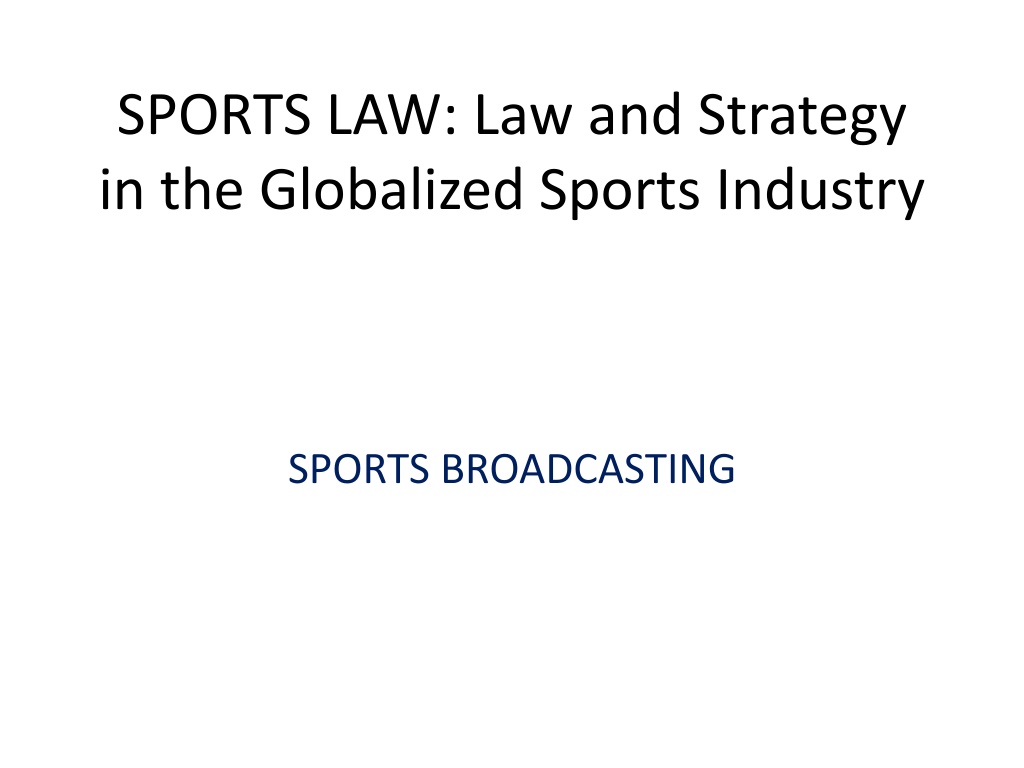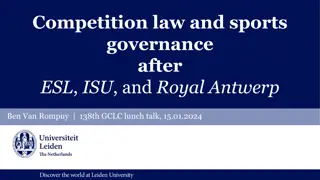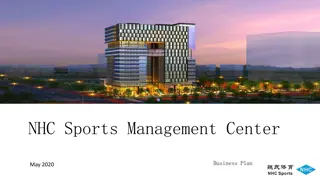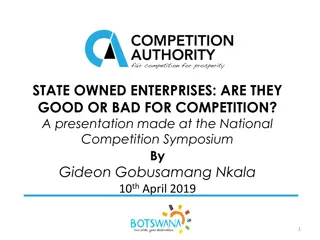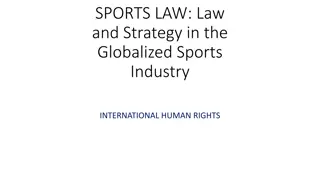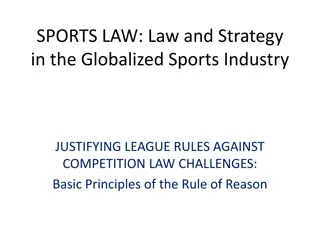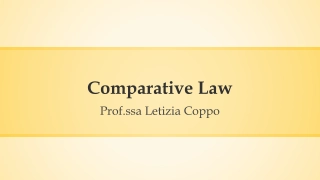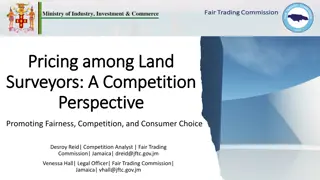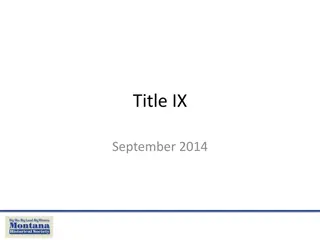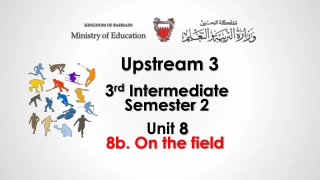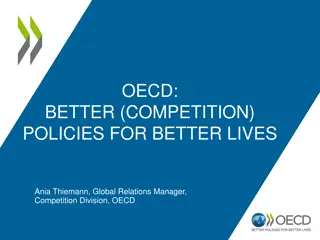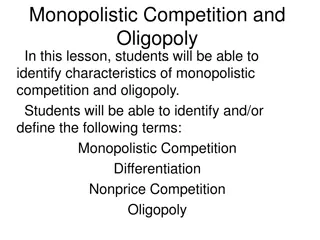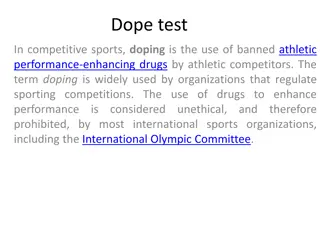Insights into the Globalized Sports Industry - Law, Strategy, and Competition
Explore the intricate legal and strategic aspects of the global sports industry, including topics such as labor exemption, antitrust issues, and competition design. Delve into key concepts like intellectual property rights in broadcasting and the challenges faced in bargaining within club-run leagues. Uncover the legal battle between US v. NFL and the restraints imposed on telecasts that compete with home game attendance.
Download Presentation

Please find below an Image/Link to download the presentation.
The content on the website is provided AS IS for your information and personal use only. It may not be sold, licensed, or shared on other websites without obtaining consent from the author. Download presentation by click this link. If you encounter any issues during the download, it is possible that the publisher has removed the file from their server.
E N D
Presentation Transcript
SPORTS LAW: Law and Strategy in the Globalized Sports Industry SPORTS BROADCASTING
Review and Takeaway: Labor Exemption (II) Brown reflects distrust in judges to balance antitrust v labor interests: bright-line rule that workers must choose antitrust or labor Brady limits ability to make choice by limiting injunctive relief if workers choose antitrust Cf EU law Looks at whether harm to consumers justified by benefits to workers But, no catch-22 for employers because labor law does not bar them from changing rules to conform to competition law
Review and Takeaway: Antitrust and Competition Design League owners typically control decisions over competition design They choose to whom league will grant competition organizing services They do so based on their own interest as club owners, not necessarily best interests of league as a whole Subject to antitrust scrutiny under rule of reason Leagues have legitimate reasons to determine who can own a club Challenger must show harm to competition if excluded for illegitimate reason Raiders: preclude competition in LA w/ Rams Leagues with market power harm competition by limiting relocation; a variety of justifications accepted in theory, but need to be proven in practice Free riding Maintain geographic scope and rivalries Operational concerns Stability, fan loyalty, and recouping local investment Improves inter-league competition [CONTINUE SLIDE 14]
Basic Concepts Recall IP doctrine: right to broadcast is a property right belonging to home team Business dynamic of TV licensing by a club-run league Each club competes League owns all rights Clubs own rights and bargain CHALLENGES in bargaining EPL/SKY DEAL NFL/CBS Spanish law [482-3]: The combined business entity might achieve efficiencies unavailable to the cartelists
US v NFL AT ISSUE WERE 3 RESTRAINTS 1> bar telecasts that compete w/ home game attendance 2> bar telecasts that compete w/ telecasts of home team's away games 3> bars radiocasts that compete w/ radiocasts of any home team games
/2 US v NFL Note early and sophisticated form of rule of reason Focus on rule s effect of improving on-field position of weaker team and weakening on-field position of stronger team [471] Claim that absent artificial rules rich will always get richer, and poor will get poorer Do you agree with the Court s conclusion that restraints on out-of-market sales, when not protecting live gate, are unreasonable? Role of conjecture [473+]
SPORTS BROADCASTING ACT 1 ALLOWS PACKAGE SALES FOR SPONSORED TELECASTING 2 BARS BLACKOUTS EXCEPT OF HOME GAMES 3 BARS NFL ON FR NITE OR SAT http://lewandpatpolitics.files.wordpress.com/2010/02/congress.jpg?w=621h=643
Response to SBA NFL took full advantage by assigning all games to a free-to-air network recent moves of Thu and Sun/Mon night games to nat l cable Other 3 leagues have responded only partially sell game-of-the-week to network per SBA each team continued to license local games w/i exclusive broadcast territories with cable, leagues sold add l games to ESPN/TNT with satellite and internet, leagues began league-wide packages for out-of-market games, although blackout local cable MLB has a general revenue sharing scheme that includes local broadcast right income, NBA/NHL have more modest revenue sharing schemes
BULLS Why did the NBA want to limit the number of Bulls games on the WGN superstation? Consider: WGN ratings: 650,000 nationwide Local cable ratings for other Bulls games in Chicago: 350,000 Of the roughly 300,000 outside-Chicago viewers, half from cities without NBA Teams Thus, average viewership of around 5,000 in each NBA market some Bulls fans some avid fans watching own team + Bulls Key: inefficient monopolization b/c can t agree on how to share money
Bulls (2): consumer preference as hallmark of antitrust analysis Where leagues face reasonable substitutes, huge pressure to overcome internal bargaining problems Case study: Big Ten Network NBA argues that it does face rivalry: focus demand by advertisers Easterbrook J, who argued for NCAA in Bd of Regents, skeptical of Supreme Court decision [491] Recall alternative hallmarks of antitrust violations [261] Price is higher Output is lower Output is unresponsive to consumer preference
Bulls (3): Quick Look QUICK LOOK: [484]: any agreement to reduce output measure by the number of televised games requires some justification some explanation connecting the practice to consumers benefits before the court attempts an analysis of market power Where a seller s decision that is unresponsive to consumer preference leaves consumer s no option, the seller has market power and there is an anticompetitive effect Cf Valley Liquor [493]: if NBA policy disserves consumers, will market retribution be swift?
Sunday Ticket DirecTV litigation 1. Does the Sports Broadcasting Act apply to sales to DirecTV? 2. Does the agreement between the NFL and DirecTV have an anti- competitive effect? 3. Are there justifications? a) free riding on other NFL clubs? b) competitive balance? http://2.bp.blogspot.com/_Mf5QsPGb6HM/THaF4l-H0MI/AAAAAAAAABs/7x_6XeVKpyI/s200/nfl_sunday_ticket.gif
MLB EXCLUSIVE TERRITORIES Does MLB have good arguments to justify the territorial scheme? What do you think would happen if MLB territories were outlawed?
TV Rights sales under European competition law Analysis of collective sales under Art 101 (Champions League) Premise: home team owns rights Relevant markets affected Focus on effect on competition among broadcasters Also focus on lessened competition among clubs Joint sales lessen competition but has efficiency benefits No benefits where no demand for games, so unlawful to restrict individual club sale Note in EPL inquiry, exclusive focus of concern was with broadcasters and not with restriction on showing of games not included in packages, whilst CL inquiry focused on unused rights Commission recognizes solidarity principle but doesn t discuss what it means for competition law
EU TV rights (2) Analysis of exclusive territorial grants under EU law (QC Leisure) EPL TV rights practices No individual club sales permitted All games televised, but <50% shown in UK All 3:00 pm Saturday games blacked out in UK Foreign rights packages sold based on demand (so higher in wealthy countries, low in Greece) ECJ emphasizes key goal to eliminate barriers to re-sale within EU [115/s165] Just as Porsche can t sell cars for less in Greece and bar resale into Germany, EPL can t sell TV rights for less Recognizes right to create an IP rights in the game, but rejects claim that IP holders have right to maximize return via geographic price discrimination
